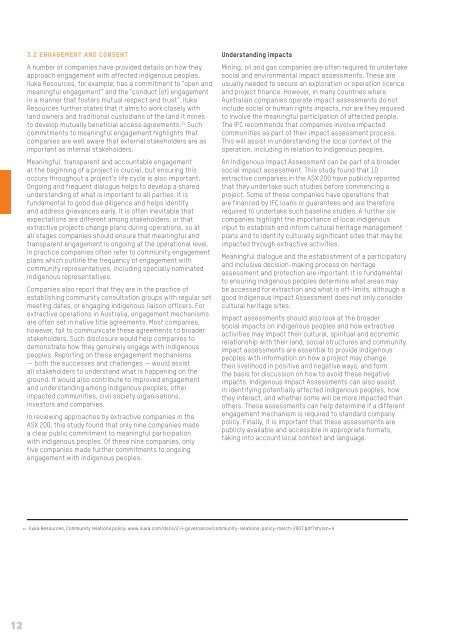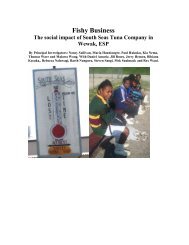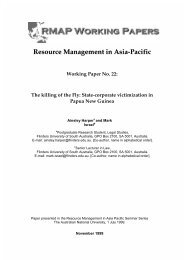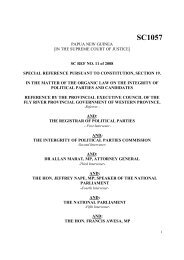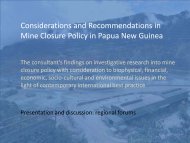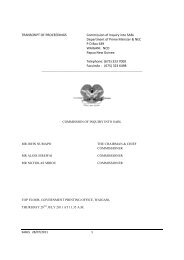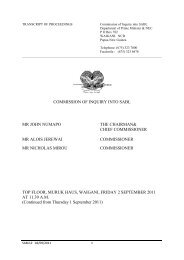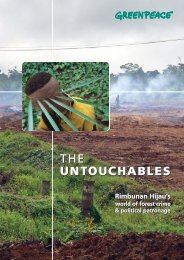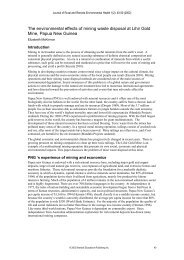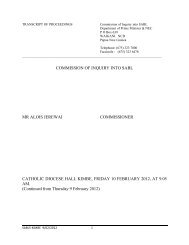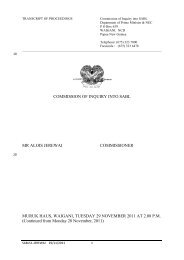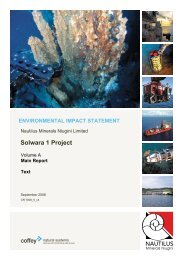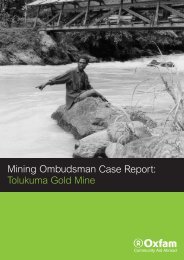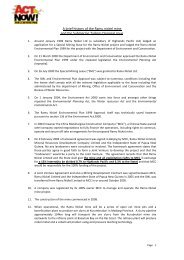Oxfam Australia and CAER: The right to decide
Oxfam Australia and CAER: The right to decide
Oxfam Australia and CAER: The right to decide
Create successful ePaper yourself
Turn your PDF publications into a flip-book with our unique Google optimized e-Paper software.
3.2 Engagement <strong>and</strong> consent<br />
A number of companies have provided details on how they<br />
approach engagement with affected indigenous peoples.<br />
Iluka Resources, for example, has a commitment <strong>to</strong> “open <strong>and</strong><br />
meaningful engagement” <strong>and</strong> the “conduct [of] engagement<br />
in a manner that fosters mutual respect <strong>and</strong> trust”. Iluka<br />
Resources further states that it aims <strong>to</strong> work closely with<br />
l<strong>and</strong> owners <strong>and</strong> traditional cus<strong>to</strong>dians of the l<strong>and</strong> it mines<br />
<strong>to</strong> develop mutually beneficial access agreements. 35 Such<br />
commitments <strong>to</strong> meaningful engagement highlights that<br />
companies are well aware that external stakeholders are as<br />
important as internal stakeholders.<br />
Meaningful, transparent <strong>and</strong> accountable engagement<br />
at the beginning of a project is crucial, but ensuring this<br />
occurs throughout a project’s life cycle is also important.<br />
Ongoing <strong>and</strong> frequent dialogue helps <strong>to</strong> develop a shared<br />
underst<strong>and</strong>ing of what is important <strong>to</strong> all parties. It is<br />
fundamental <strong>to</strong> good due diligence <strong>and</strong> helps identify<br />
<strong>and</strong> address grievances early. It is often inevitable that<br />
expectations are different among stakeholders, or that<br />
extractive projects change plans during operations, so at<br />
all stages companies should ensure that meaningful <strong>and</strong><br />
transparent engagement is ongoing at the operational level.<br />
In practice companies often refer <strong>to</strong> community engagement<br />
plans which outline the frequency of engagement with<br />
community representatives, including specially nominated<br />
indigenous representatives.<br />
Companies also report that they are in the practice of<br />
establishing community consultation groups with regular set<br />
meeting dates, or engaging indigenous liaison officers. For<br />
extractive operations in <strong>Australia</strong>, engagement mechanisms<br />
are often set in native title agreements. Most companies,<br />
however, fail <strong>to</strong> communicate these agreements <strong>to</strong> broader<br />
stakeholders. Such disclosure would help companies <strong>to</strong><br />
demonstrate how they genuinely engage with indigenous<br />
peoples. Reporting on these engagement mechanisms<br />
— both the successes <strong>and</strong> challenges — would assist<br />
all stakeholders <strong>to</strong> underst<strong>and</strong> what is happening on the<br />
ground. It would also contribute <strong>to</strong> improved engagement<br />
<strong>and</strong> underst<strong>and</strong>ing among indigenous peoples, other<br />
impacted communities, civil society organisations,<br />
inves<strong>to</strong>rs <strong>and</strong> companies.<br />
In reviewing approaches by extractive companies in the<br />
ASX 200, this study found that only nine companies made<br />
a clear public commitment <strong>to</strong> meaningful participation<br />
with indigenous peoples. Of these nine companies, only<br />
five companies made further commitments <strong>to</strong> ongoing<br />
engagement with indigenous peoples.<br />
Underst<strong>and</strong>ing impacts<br />
Mining, oil <strong>and</strong> gas companies are often required <strong>to</strong> undertake<br />
social <strong>and</strong> environmental impact assessments. <strong>The</strong>se are<br />
usually needed <strong>to</strong> secure an exploration or operation licence<br />
<strong>and</strong> project finance. However, in many countries where<br />
<strong>Australia</strong>n companies operate impact assessments do not<br />
include social or human <strong>right</strong>s impacts, nor are they required<br />
<strong>to</strong> involve the meaningful participation of affected people.<br />
<strong>The</strong> IFC recommends that companies involve impacted<br />
communities as part of their impact assessment process.<br />
This will assist in underst<strong>and</strong>ing the local context of the<br />
operation, including in relation <strong>to</strong> indigenous peoples.<br />
An Indigenous Impact Assessment can be part of a broader<br />
social impact assessment. This study found that 10<br />
extractive companies in the ASX 200 have publicly reported<br />
that they undertake such studies before commencing a<br />
project. Some of these companies have operations that<br />
are financed by IFC loans or guarantees <strong>and</strong> are therefore<br />
required <strong>to</strong> undertake such baseline studies. A further six<br />
companies highlight the importance of local indigenous<br />
input <strong>to</strong> establish <strong>and</strong> inform cultural heritage management<br />
plans <strong>and</strong> <strong>to</strong> identify culturally significant sites that may be<br />
impacted through extractive activities.<br />
Meaningful dialogue <strong>and</strong> the establishment of a participa<strong>to</strong>ry<br />
<strong>and</strong> inclusive decision-making process on heritage<br />
assessment <strong>and</strong> protection are important. It is fundamental<br />
<strong>to</strong> ensuring indigenous peoples determine what areas may<br />
be accessed for extraction <strong>and</strong> what is off-limits, although a<br />
good Indigenous Impact Assessment does not only consider<br />
cultural heritage sites.<br />
Impact assessments should also look at the broader<br />
social impacts on indigenous peoples <strong>and</strong> how extractive<br />
activities may impact their cultural, spiritual <strong>and</strong> economic<br />
relationship with their l<strong>and</strong>, social structures <strong>and</strong> community.<br />
Impact assessments are essential <strong>to</strong> provide indigenous<br />
peoples with information on how a project may change<br />
their livelihood in positive <strong>and</strong> negative ways, <strong>and</strong> form<br />
the basis for discussion on how <strong>to</strong> avoid these negative<br />
impacts. Indigenous Impact Assessments can also assist<br />
in identifying potentially affected indigenous peoples, how<br />
they interact, <strong>and</strong> whether some will be more impacted than<br />
others. <strong>The</strong>se assessments can help determine if a different<br />
engagement mechanism is required <strong>to</strong> st<strong>and</strong>ard company<br />
policy. Finally, it is important that these assessments are<br />
publicly available <strong>and</strong> accessible in appropriate formats,<br />
taking in<strong>to</strong> account local context <strong>and</strong> language.<br />
35. Iluka Resources, Community relations policy: www.iluka.com/docs/2.4-governance/community-relations-policy-march-2007.pdf?sfvrsn=4<br />
12


